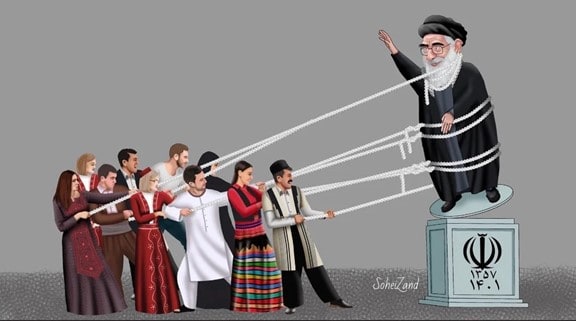Israel's imminent strike on Iran, in response to the Iranian ballistic attack on the first of October, could be an opportunity for the peoples of Iran to rise up against the Islamic regime.
However, the key for any "regime change" in Iran is in its ethnic "minorities" that have been marginalized and violently repressed over the years. If the whole country rises up, the regime will withdraw its forces from border regions like Kurdistan to central Iran and Tehran. That is the time when the West should support the Kurds, Balochs, and other ethnic groups to topple the regime.[1]
Since the mid-2000s, after a series of violent clashes between the Islamic republic of Iran and the various ethnic groups in the country, Iran's military and political elites were afraid of a possible "hybrid war" scenario against the Islamic republic. Such a hybrid war would comprise widespread national protests coinciding with an external military attack. This will be the time for it.

The ethnic groups in Iran toppling the Islamic Republic of Iran together.
Establishing A Coalition Against The Islamic Republic Of Iran
There is now a need for an organization/coalition outside Iran designed to unite the Iranian opposition around a common platform. It is important that the entire society, Persians and non-Persians alike, is uniting to pursue the common goal of regime change. Hence, a steering committee, which would be the official voice of the Iranian opposition – similar to the united Iraqi opposition front against the Iraqi Ba'ath regime in London in 2002, despite the radical disagreements among the wrangling Iraqi political groups – should be established.
It is worth stressing that the political agenda of this anti-regime organization should seek to endorse a democratic confederalist future for Iran, with minorities given the option of pursuing their right to self-determination.
Inside Iran, there is a need to provide ethnic groups with self-defense capabilities.
The ideology of "Iranianness (Iraniyyat)," in which Persians rule over the others, that was championed by the Pahlavis and then by the subsequent regime of the Ayatollahs, is doomed to collapse, since it has never evolved into a social contract between the regime and the many different ethnic and religious groups in the country.
The Persian diaspora should seek a middle ground with the ethnic minorities and support the idea of a democratic confederalism for the future of Iran.
The Kurdish feminist slogan "Jin, Jiyan, Azadi," (Woman, Life, Freedom – in Persian, "Zan, Zendegi, Azadi"), which has become the rallying cry of Iranians, is a tenet of this political concept that could likewise be adopted as the political agenda by all Iranian opposition groups, for the new political order emerging after the downfall of the Ayatollahs.
Democratic confederalism can be characterized as a bottom-up system for self-administration and self-determination, aimed at transcending the idea of a hierarchical and centralized state through the creation of confederations that accept ethnic, religious and political realities. Thus, it could be a unifying framework for the different ethnic and religious organizations that represent the different segments of Iran.
A New Era In Iranian History
"Pan-Iranism," along with "Shi'ism," are failed ideologies that have failed to form a social contract among Iranians since the establishment of modern Iran in 1921. Therefore, an alternative political and social contract based on Democratic Confederalism needs to be forged among all the ethnicities of Iran, recognizing their right to autonomy and self-determination – thus abandoning the old statist and centralizing Iranian nationalist project for a democratic-confederal one that no longer aims to build an inherently imperial and oppressive Iranian nation-state.
The goal should instead be the establishment of a decentralized entity, based on democratic confederalism, that sets the stage for a new era in Iranian history and politics with new ethno-states, emerging after the ethnic minorities are granted the right to make decisions about their lives and determine their own economic, cultural, and social affairs.
Regime change alone is not enough. But democratic confederalism could serve as a radical model for political emancipation in Iran. It could work as a temporary, transitional, intergovernmental project in post-Ayatollah Iran until the establishment of new ethno-states in the Balochistan, Kurdistan, Ahwaz, and Caspian regions, based on mutual respect and common interests.
*Himdad Mustafa is a Kurdish scholar and expert on Kurdish, Iranian and Turkish affairs.
[1] See MEMRI Daily Brief No. 661, Regime Change In Iran Is Possible Only By Supporting Its Ethnic Minorities, October 18, 2024.





